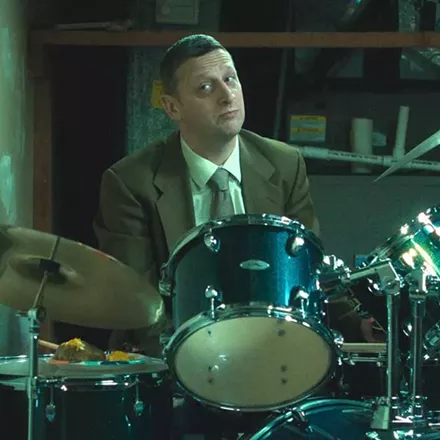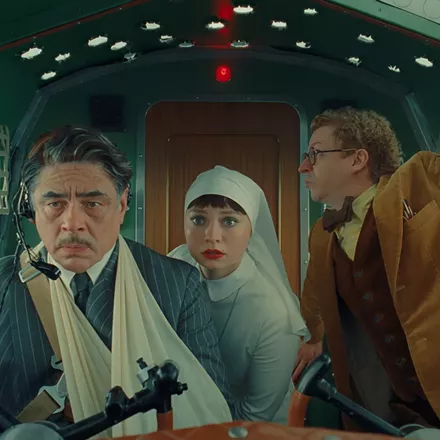Date Night
Funny People: For the conventionally comedic Date Night, success is all about the stars.
By Scott Renshaw @scottrenshawAt first glance, that might not seem like the most obvious conclusion to reach from a movie like this. After all, Steve Carell and Tina Fey aren’t super-size comedy personalities like Jim Carrey, Adam Sandler or Will Ferrell, who have turned their comic films into brand names. They’re likeable and smart, without giving you the impression that they’re wrenching their material into the shape that best suits their on-screen personae. Pay close attention to most of the payoff scenes in Date Night, though, and think about whether any of it is funny without what they bring to the table.
The entire premise is built on the stars’ perceived ordinariness. Phil Foster (Carell) and his wife Claire (Fey) are a New Jersey couple who have fallen into that familiar routine of suburban spouses everywhere: Every ounce of time is spent maintaining their kids and their jobs, leaving little for each other except the occasional night out. After learning that some married friends are separating, Phil suggests a break in the routine by way of dinner at a posh Manhattan restaurant. Getting a table will, unfortunately, require stealing the spot of a couple who don’t claim their reservation. And that couple, unfortunately, appears to have caught the attention of some mobsters and crooked cops.
The late-night odysseys of workaday folks have generated offbeat comedies like After Hours and Into the Night over the years, but the script by Josh Klausner points to much more conventional directions. Once the Fosters have been mistaken for the “Tripplehorns,” there are wild getaways, shootouts, car chases and a few occasions for our milquetoast heroes to pretend to be more badass than they actually are. While director Shawn Levy (Night at the Museum) wrangles it all into something resembling a movie, nothing here yanks you in a direction you’d never have predicted. It’s a bowl of cinematic ice cream, and it’s vanilla.
If anything is going to add flavor to that bowl, it’s going to be Fey and Carell. There’s no way of knowing whether specific lines came from a script or from improvisation, but you can get a pretty decent hint from those outtakes for a few key, successful scenes. In one, Phil and Claire play a favorite game in which they try to guess the “story” of another couple sitting near them in a restaurant, each one delivering their imagined half of a conversation. Later, they return to the restaurant in the role of trendy a-holes to get some needed information. And when they finally encounter the real Tripplehorns, there’s an exchange of tough-guy patter between Phil and the tattooed thief (James Franco). I’m sure that the original script included some kind of dialogue at those points; I’m equally sure that once the cameras rolled, the direction for several takes amounted to “say and do funny things here.”
Fey and Carell clearly are capable of saying and doing plenty of funny things. They both excel at making self-deprecation seem casual and genuine, like Claire picking a specific stripper disguise because “it was the only one long enough to hide my C-section scar.” They’re also both at their best in situations in which they’re smarter than people around them, tossing off withering lines with pinpoint accuracy. And it helps that they’re both deft enough actors to make the subtext about reinvigorating a relationship feel like something that isn’t thoroughly tacked on.
You can see the strain, though, in a late scene in which Phil and Claire have to do an impromptu pole dance at a sex club. The intentional physical awkwardness doesn’t play to the actors’ strengths, and only makes it that much clearer that when Fey and Carell aren’t nailing a scene in Date Night, there’s really not much reason to be watching. But they do nail a whole lot of their scenes, enough to make the silly plot shenanigans and occasional manic set pieces easy to ignore. Making a successful Hollywood comedy sometimes can be just as simple as pointing talented performers in the right direction, and getting the hell out of the way.
DATE NIGHT
Steve Carell, Tina Fey, Mark Wahlberg
Rated PG-13
|
Scott Renshaw:
|
Speaking of...
-
South of the Point: Date Night
- Aug 2, 2012
-
More Frightening Than a Clown
Which is more frightening—Ronald McDonald and Bozo or Utah Senators Michael Waddoups and John Valentine?
- May 25, 2011
-
Men Behaving Badly
Do any men you know behave badly?
- May 11, 2011
- More »
More by Scott Renshaw
-
Writer of the Lost Oligarch
The Phoenician Scheme gets both silly and serious about what makes rich dickheads tick.
- Jun 4, 2025
-
Film Reviews: New Releases for May 30
Karate Kid Legends, Bring Her Back, Jane Austen Wrecked My Life, Bad Shabbos, Tornado
- May 29, 2025
-
JANE AUSTEN WRECKED MY LIFE, BRING HER BACK, June 2025 Special Screenings
Two new releases, plus SLFS Summer Showdown, Wild & Scenic Festival and more.
- May 28, 2025
- More »
Latest in Film Reviews
Readers also liked…
-
Sundance 2025 wrap-up plus February special screenings
Uncertainty about the future location shifts focus away from the movies
- Feb 5, 2025












